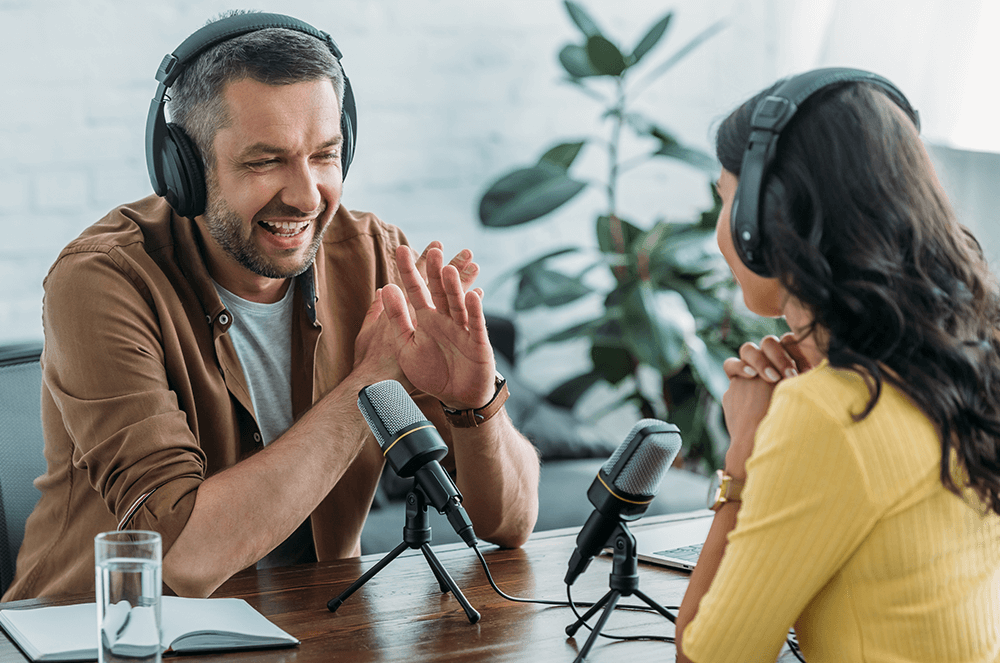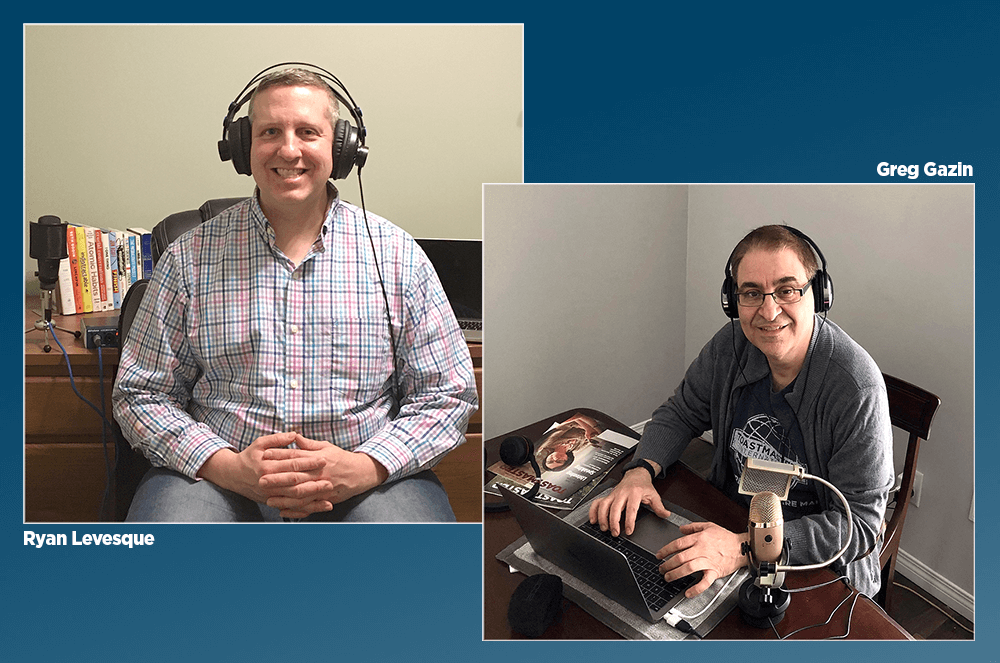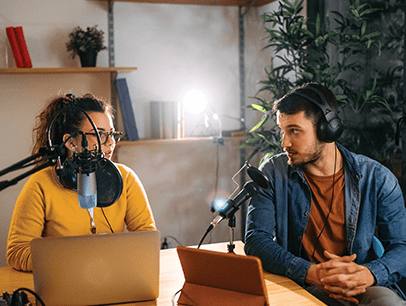Click play to hear the hosts of The Toastmasters Podcast talk about their experiences behind the mic.
Over the last year, the number of podcasts and podcast listeners has soared, especially with more people staying closer to home. As of April 2020, there were over 1 million podcasts available through Apple Podcasts alone, covering just about every conceivable topic—that’s a wealth of content at our fingertips.
If you’re already a podcast listener, have you considered getting behind the microphone and starting your own show? It’s a great way to share information, promote your business, learn a new hobby, or take on the podcasting project as a Level 4 elective in Pathways.
Podcasting is truly a gold mine for anyone wanting to boost their skills, and what better time to do so than now as we enter a new year? Consider podcasting from three sides of the mic: the host, the guest, and the listener.
As a podcast host, you’ll become adept talking to a diverse group of people. I can speak to this personally as both the co-host and producer of The Toastmasters Podcast and the ToastCaster. I have been a member of Toastmasters for 19 years and began podcasting in 2006 as part of a Toastmasters High Performance Leadership project.
In fact, Ryan Levesque, podcast producer and my co-host on The Toastmasters Podcast, says, “As a host, interviewing many diverse guests has taught me to rapidly build rapport and converse easily with all kinds of people, from CEOs of large corporations to community leaders, and everyone in between.”
As a podcast guest, you can practice impromptu speaking skills necessary for job interviews, have an opportunity to showcase your expertise, or promote your business.
Finally, as a listener, you can absorb fascinating niche and relevant content. As a Toastmaster, you can also conduct your own mental evaluation of the entire episode, just as you might after a club meeting.
In essence, creating a podcast provides an opportunity to practice the skills we learn in Toastmasters and perform in everyday life.

Pick Your Podcast Format
Once you’ve decided to make the plunge, the first task is deciding on a topic or angle for the show. Perhaps you and a friend will be reviewing the newest gizmos and gadgets or discussing the latest incarnation of Doctor Who. Name your show. Make it fun and catchy, or simply descriptive. (Toastmasters Podcast isn’t a particularly creative name, though it’s certainly descriptive!)
Dawn Frail, DTM, is a leadership development specialist, and Immediate Past District Director of District 60 in Ontario, Canada. She started her podcast, Frankly Speaking, as a marketing tool for her District. “We wanted to inspire current Toastmasters to continue their journey and attract new members to the organization. We decided to have conversations with lesser-known members with interesting and fabulous stories to share,” she says.
Then you’ll want to determine the format—solo or co-hosted? The beauty of going solo is that you can record any time you want. You may find the interview format, either solo or with a co-host, is one of the easiest ways to get started, because your guests, not you, supply the fresh content.
As a podcast guest, you can practice impromptu speaking skills necessary for job interviews, have an opportunity to showcase your expertise, or promote your business.
Scottish-based podcaster Colin Gray, on his website ThePodcastHost.com, calls the practice of hosting compelling guests “borrowing the expertise or entertainment value of others.” The benefit? “It’s like talking to your heroes. (It) gives you the opportunity to have a chat with someone you’ve always looked up to.”
Levesque agrees. “Podcasting has led me to interview people I could never have imagined when I first started—rapper MC Hammer, author John Maxwell, Craig Newmark (Craigslist founder), William Hung from American Idol, Tony Buzan (creator of the Mind Map, and Golden Gavel recipient), author Keith Ferrazzi, and more.”
If you’re wondering where to start, check out the “Create a Podcast” elective in Level 4 of the Pathways learning experience. “I was new to podcasting,” says Jenson George, a member of three clubs in Dubai, United Arab Emirates. “It was (fellow club member) Ashish Gokhale’s idea to have casual conversations similar to The Joe Rogan Experience and have fun.” Together they created the Roastmasters Podcast. After becoming an Area Director in July 2020, Jenson and others stirred up some interest that led to the formation last August of a new advanced club in Dubai, Podcasters Toastmasters.
Where else can you learn so much and have loads of fun doing it?
Prep Work
Frail suggests selecting guests with interesting stories or a message to share. I’ve discovered that you’ll be more successful if you let them know ahead of time what topic or angle you want to discuss on the program. Request a bio or other background information. Confirm the day, date, and time, and pay close attention to the time zone if the guest is not local to you. It’s also a good idea to communicate any expectations, how much time you’ll need, and how you will be recording, and offer to assist them with the technology should the need arise.
Technical Considerations
As for equipment, a podcast can easily be recorded on a digital recorder, mobile device, or computer. You don’t need to run out and buy expensive equipment. To get the best possible audio, however, it’s preferable to have a USB mic and headphones, or at least a decent set of earbuds. Avoid using your computer’s built-in mic and speakers whenever possible. The mic may pick up fan noise, and sound coming through the speakers can also feed back into the mic.
For coordinating remote podcast interviews, programs like Skype and Zoom allow you to capture audio. At The Toastmasters Podcast, we now use Zencastr exclusively, as it records each individual locally on a separate track before uploading the audio to the cloud drive. This makes for easier editing, offers better audio quality, and creates less reliance on internet stability. For editing and local recording, you can also use free programs like Audacity for PC or Mac.
Preparing Questions
When you prepare questions for an interview, keep them brief. Avoid yes or no questions that may elicit one-word answers.
To help your guest open up, ask specific questions. For example, instead of asking, “Tell me about what you do for a living,” consider asking, “What it’s like being the CEO of XYZ?,” or “What does a typical day look like for you?” Those kinds of questions will tap a part of the guest’s brain that’s likely to produce more original, authentic responses.
Sometimes you may need to ask a difficult, sensitive, or personal question, but are not sure how, or if you should ask.
Greg Van Borssum, a professional speaker and Toastmasters Accredited Speaker, from Killcare Beach, New South Wales, Australia, recounted in a Toastmaster magazine article about his dark days in such despair he almost considered taking his own life. That information had already been published, so I asked Van Borssum in the pre-interview if he would be okay with including that question in our interview.
He suggests asking, using phrasing like, “Do you mind if I ask you a personal question because it might help me or the audience?” If it comes from a place of learning or sharing of knowledge, he explains, you’ll likely get a positive response.
Cultural Considerations
The nature of podcasting is that content can be created in one part of the world and consumed in another. “There are really no borders to this,” says Gokhale, banker and Vice President Education of the Podcasters Toastmasters Club in Dubai. “It’s better to realize the sensitivities and that there may be subtle differences to be aware of.”
Van Borssum says he tries to avoid Australian vernacular unless he uses it as a joke—but will also explain what it means.
If you’re unsure if a topic or a question would be acceptable to your guest, do some research on cultural communication differences or simply ask if there are certain ones that should not generally be discussed.
Checking the Details
To ensure smooth sailing before the interview, make sure your surroundings are quiet, and reduce potential distractions. Turn off other devices and disconnect any distractions on your computer, such as internet tabs or email notifications. Do a sound check and make sure audio passing through the mic is being recorded.
“It’s the one that got away,” recalls Digital Media Strategist Robert Lavigne, from Brantford, Ontario, host of The Disposable Web. After securing a coveted live interview, he ended up with a blank recording. Lavigne recommends always monitoring your recording and running a secondary recording device as backup.
Go over last-minute details with your guest. Gauge their comfort level and calm any butterflies with casual conversation or questions about themselves.
Your guest may say something insightful or unexpected that shifts the conversation to a new and exciting direction, leading you to ask an unplanned question. “Use your questions as a guide, but also be prepared to go off script,” says Levesque.
As a podcast guest, you can practice impromptu speaking skills necessary for job interviews, have an opportunity to showcase your expertise, or promote your business.
A good interviewer needs to be an equally good listener. “Be present,” says Frail, “Hear what they’re saying, and don’t be overly focused on your next question.”
Some guests may come overly prepared. One individual who insisted on knowing the questions ahead of time proceeded to read all her answers. If that happens, politely interject and perhaps ask a question like, “How do you feel about that?” You may get a more natural response.
Sometimes your guest will go off on “bunny trails,” says self-professed random thinker and Past Toastmasters International President Pat Johnson, DTM. “That happens when I’m engaged and passionate and have so many ideas.” If you’re afraid to politely interject, don’t be. “I’m grateful to be put back on track,” she adds.
Ask your guests for final thoughts or parting words, and how people can reach them. They may want to use that time to pitch their new book, steer listeners to their professional website, or mention an article they were profiled in.
Post-Interview
Once you’ve completed the official interview, keep the recording; you never know what kind of golden nuggets may come out. It’s also a great way to get a few extra sound bites (short clips of audio extracted from a recorded interview) you might need to help promote the interview.
 Ryan Levesque (left) and Greg Gazin, DTM, are co-hosts of The Toastmasters Podcast.
Ryan Levesque (left) and Greg Gazin, DTM, are co-hosts of The Toastmasters Podcast.Likely you will need to do some editing to create a narrative, including show notes, which are a description or summary of your podcast episode, and where you might also include links and contact information. Before the podcast goes live, listen to it uninterrupted in its entirety as if you were a new listener. This is where you can catch tiny miscues, eliminate unnecessary verbiage, and enjoy the fruits of your labor. Podcasts can range from a 3-minute thought of the day to an hour-long recap of the latest Netflix series. I’ve found the sweet spot to have a great conversation and get the message across to be on average 20–30 minutes—like a half-hour talk show.
You’ll also need to find a place to host your podcast. Search to find one suitable for you. Hosts like Podbean and BuzzSprout offer free starter packages where they can take care of many of the logistics. This includes housing your audio and submitting your podcast feed to directories like Apple Podcasts (formerly iTunes), Google Podcasts, and Spotify where listeners can easily subscribe to them.
Once the show is published, promote the podcast on your social media channels. It’s also a good idea to learn where your audience is. It may be Instagram, a particular Facebook group, or professional association site. Promote it there.
Finally, send a thank you note to your guest, along with links to the podcast, and encourage them to share with their audiences and social circles.
Lasting Benefits
Podcasting helps you become a better communicator, but it also offers a range of leadership skills, such as project management, time management, relationship building, collaboration, dealing with disruptions, critical thinking, decision-making, and emotional intelligence. And don’t forget the technical skills you’ll develop.
So, is there a podcast in your future?
That’s up to you; why not give it a whirl? You don’t need to commit to starting a podcast empire. Find a topic that interests you, get the mic warmed up, and use it as an opportunity to gain experience and confidence.
Fifteen years and hundreds of interviews and podcast episodes later, if I could borrow from McDonald’s slogan, “I’m (Still) Lovin’ It!”
Look for this article on social media and continue the conversation with #talkingtoastmasters.
Greg Gazin, DTM is a Past District Governor and veteran podcaster, co-hosting The Toastmasters Podcast and producing the award-winning ToastCaster. He is also a writer, author, speaker, and member of New Entrepreneurs Club in Edmonton, Alberta, Canada.
Related Articles

Communication




 In the Hot Seat
In the Hot Seat
